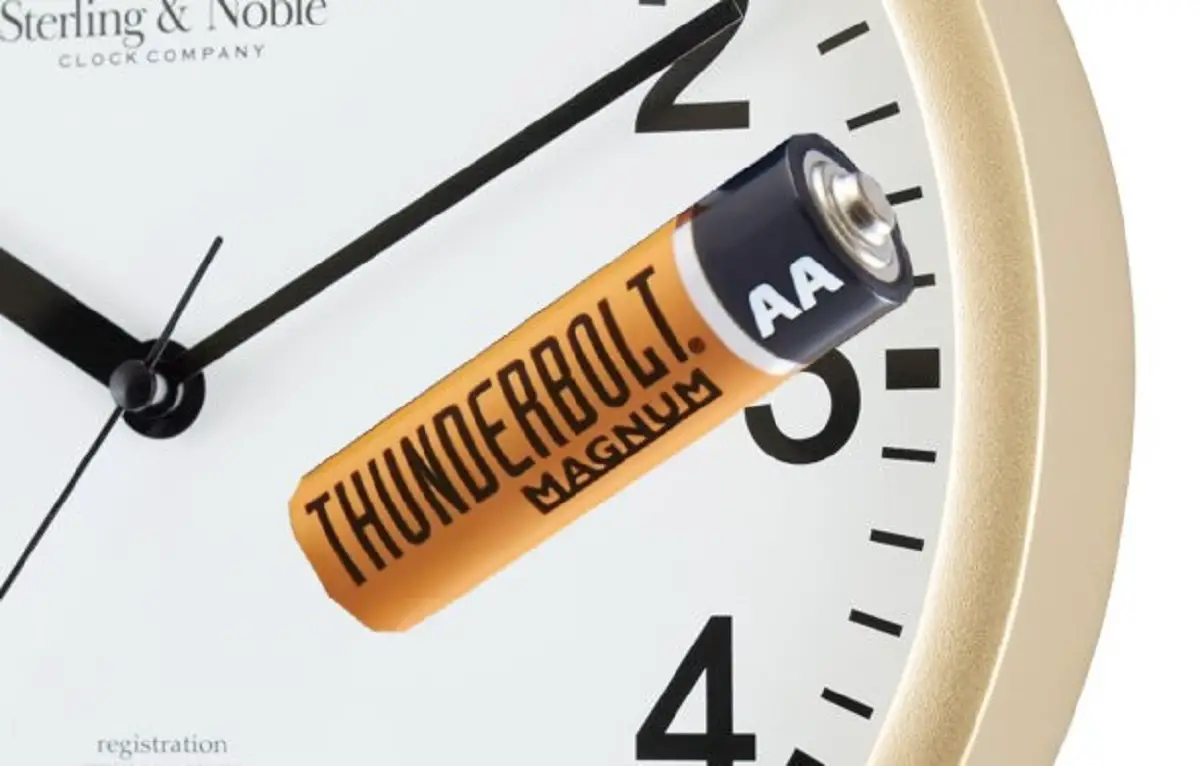A new-new battery and wall clock might not be the best combination.
Earlier today I bought a cheap wall clock from WalMart. Discounted to $3, I was really happy with my purchase.

On the way home I stopped off at Harbor Freight and picked up a 24-pack of Thunderbolt Magnum AAs for $5.
When I got home, I popped in a fresh HF TM AA into my new clock and to my surprise, the hands did not move!
I tried another, new AA battery and the same result.
Chinese made stuff like quartz clocks are cheap but, with mass production of such a common item comes a certain level of consistency and I doubted something so “simple” could be broken.
The same with the new alkalines, no way these things were useless out of the box.
Just to try, I popped in a NIMH rechargable battery lying around and behold, the clock started ticking!
I tried another used Alkaline AA lying around and the clock worked, too.
The clock works, so the new Harbor Freight Thunderbolt Magnums are to blame?
I had to test them.
I pulled out my multi-meter and measured the voltage.
My new, fresh Harbor Fright Thunderbolt Magnum AAs measured around 1.8 volts. I tested a few others, the same voltage.
I even popped one into my Coast H1, single AA flashlight to see if it powers on and yes, it works.
That partially discharged NIMH measured in at 1.27 volts and the other used Alkaline measured 1.44 volts.
I’m slightly familiar with batteries and know that new or freshly charged batteries have an initial voltage that’s much higher than its nominal or working voltage.
After using the battery, the initial voltage quickly drops off to its nominal voltage.
In this case, if I used those Alkaline Harbor Freight Thunderbolt Mangums in that flashlight for my early morning walk, when I came home and measured the voltage, it would’ve dropped from 1.8 to 1.5ish.
My guess is that, since that cheap, quartz movement wall clock draws so little power, 1.8 initial volts might be incompatible with it. If I popped in the batteries after using them in something else, they might work.
I also did some research and found out some cheap clock manufacturers in China do not recommend Alkaline batteries for their clocks at all.
Instead, they recommend a Zinc Chloride battery.
As it pertains to Quartz movement clocks,
” Use a low-mid cost zinc-based battery on the quartz clock alarm or wall clock,” Hoseki clocks says. “Give the super heavy duty alkaline batteries a miss, as we have it on statistics that the heavy duty alkaline batteries are over driving the quartz clock movement, causing them to burn out beyond repair.”
And some clock manufacturers like Rhythm state that, in regard to Alkaline batteries for their clocks,
“There are some brands of alkaline batteries that may NOT work properly with these clocks. We recommend using Dollar General, Harbor Freight, any 99 cents store, or any battery labeled “HEAVY DUTY.” DO NOT use Duracell or Energizer, which are “LONG-LASTING,” not “HEAVY DUTY.”
These clock manufactuerers recommend Zinch Cholride batteries for their low draw quartz movement clocks and, if you have to use Alkalines, use the cheap ones, instead.
I had some slightly more expensive Thunderbolt Edge Alkaline Batteries lying around, so I popped it into the clock, and, so far it’s ticking along, working fine.
I measured the voltage and, since it was sitting around for several months, the voltage on those Thunderbolt Edges measured in at around 1.6ish volts.
Conclusion
As to why new Harbor Freight Thunderbolt Magnum AA batteries didn’t work in my new, cheap, Quartz movement wall clock, I think it might either be because the Alkalines were too fresh at 1.8 volts….
or
…this particular clock does not specifically work with that kind of Harbor Freight Thunderbolt Magnum AA.
From now on, I’m going to buy cheap, zinc chloride batteries for my wall clocks.
If you ever run into the case where your new (or old) wall clock doesn’t work with fresh Alkaline batteries, try putting in a used Alkaline instead.
If that works, buy some cheap Zinc Chlorides and pop those in.
Additional sources:
–https://www.physicsforums.com/threads/the-41-second-clock-failure-syndrome.1008510/
